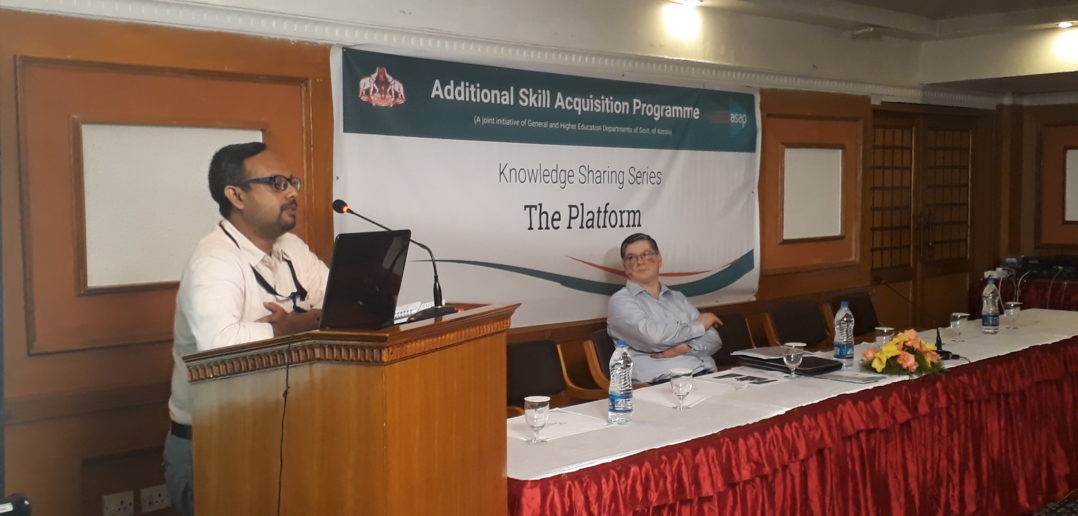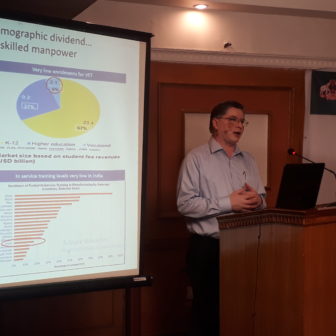“We must see world as the employer and orient our skilling strategies to meet global job demands of the future” – the statement by Mr. Dilip Chenoy, (former CEO and MD of the NSDC) at ‘The Platform’, the first Knowledge Sharing series discussion organized by the Additional Skill Acquisition Programme (ASAP), Government of Kerala on May 10th 2017 at Thiruvananthapuram was a powerful message to programmes like ASAP.
‘Knowledge is power and experience is magic’, is the idea behind ‘The Platform’ for creating an awareness on skill development initiatives of Central Government, to deliberate on emerging job roles, skill deficit and demand, innovative practices, and various other opportunities and challenges in the developing skill ecosystem among various stakeholders. Academics, policy makers, administrators, trainers, ASAP officials and Programme Managers, people who are in to skill training, took part in the programme.
 Delivering the introductory note, Dr Reju MT, CEO, ASAP highlighted the challenges faced during skill training in Kerala and pointed out that though entire country will continue to enjoy the benefits of high demographic dividend during the coming decade, Kerala doesn’t have an edge due to its continued low fertility levels. High aspiration level of students and aversion for blue colored jobs makes skill education least preferable among youth in Kerala. Further, he expressed that sharing of knowledge may help in providing holistic solutions to important issues pertaining to skill training such as standardization of curriculum, assessment process and trainer availability.
Delivering the introductory note, Dr Reju MT, CEO, ASAP highlighted the challenges faced during skill training in Kerala and pointed out that though entire country will continue to enjoy the benefits of high demographic dividend during the coming decade, Kerala doesn’t have an edge due to its continued low fertility levels. High aspiration level of students and aversion for blue colored jobs makes skill education least preferable among youth in Kerala. Further, he expressed that sharing of knowledge may help in providing holistic solutions to important issues pertaining to skill training such as standardization of curriculum, assessment process and trainer availability.
 In his presentation, Mr Dilip Chenoy pointed out that the lack of skilled man power in the country is a growing concern as far as reaping the benefits of high demographic dividend are concerned. Stating that Students, Educators and Employers live in parallel universes, he said 27 million students drop out at the under graduate level in India. Major challenges confronting skill development were highlighted as making vocational education aspirational, effective student mobilization, quality of skill training and a favorable environment. Also it was pointed out that number of students who pass out from schools are more in number than the actual seats available for higher education which in fact underlines the importance of skill education as an alternate means of learning.
In his presentation, Mr Dilip Chenoy pointed out that the lack of skilled man power in the country is a growing concern as far as reaping the benefits of high demographic dividend are concerned. Stating that Students, Educators and Employers live in parallel universes, he said 27 million students drop out at the under graduate level in India. Major challenges confronting skill development were highlighted as making vocational education aspirational, effective student mobilization, quality of skill training and a favorable environment. Also it was pointed out that number of students who pass out from schools are more in number than the actual seats available for higher education which in fact underlines the importance of skill education as an alternate means of learning.
Challenges in skilling – major points raised in the presentation
Shortage of quality trainers, assessors and Training Service Providers hamper smooth operation of skilling initiatives in the country. Considerable funding has to be provided by Governments to offer quality skill education to the students through attractive incentives to quality trainers and for developing a better skill ecosystem in the country. Scale and speed are the hallmark of the Ministry of Skill Development and Entrepreneurship’s (MSDE) focused interventions to create a Skill ecosystem for empowerment of youth through quality skilling for promoting a culture of entrepreneurship. The Skill policy is proposed to be revised in 2017 to create demand for skilling and also to look into competencies (skills, knowledge and attitude).
Almost all states have skill development missions and some like Rajasthan and Uttar Pradesh have amalgamated almost all central government skill development programmes under one central mission. Others have mirror image for central schemes like the DDUGKY or NULM in their states. States like Andhra Pradesh, Bihar, Kerala and Rajasthan have additional allocations for skill development. International engagements in skilling such as that being followed by Delhi in connecting with Singapore are models worth exploring.
The National Skill Development Corporation recognizes 29 industry sectors for skill development. Studies have revealed that building and construction, retail, beauty and wellness, furniture and furnishing, logistics, hospitality and tourism, textiles, handloom and handicrafts, domestic help and private security sectors account for about 80% of human resource requirements. Low aspiration levels among youth towards skilling are a matter of great concern in realizing the goal of human resource development.
As far as Kerala is concerned, the building and construction sector has high potential for employment, thought it ranks low in terms of youth preference. Sectors such as BFSI, IT/ITeS/Healthcare, Engineering Products and Education/Skill Development are preferred sectors. Despite best efforts by the state there is a severe shortage of human resource in the many sectors.
NSDC’s three pronged approach ‘Create, Fund and Enable’ catalyzes private sector investment to create demand by introducing large number of skill training institutions and funding through grants. This will create a viable skill environment ensuring quality standards.
Integrating skills with education is the need of the hour as only knowledge is gained through the conventional education system. Skills can be acquired only through practical training for which there is no space in our present education system. This makes National Skill Qualification Framework compliance (level 1 to 4) from class 9th standard onwards mandatory.
Also, international exposure through participation in competitions such as the World Skills Summit (the next edition of which is being planned in Abu Dhabi during October 2017) will give students good exposure and encouragement for skill training.
The Ministry / NSDC has engaged proactively with several countries with the purpose of:
- Technology transfer in vocational training,
- Training of trainers,
- Setting up of model centers of excellence.
- Creation of international mobility through mapping of job roles and development of transnational standards.
- Funding : ADB, DFID, World Bank
Deliberating upon other avenues for skill training apart from Government initiatives, Mr Chenoy added that there are a number of private sector initiatives in Skill Development that are not directly linked to the skilling mission of the Government of India. Firms that carry out training on a commercial basis, firms that carry out in-house training and company related training ,companies that contribute to CSR ( more than Rs 2000 crores allocated for education and skills ), and Agents that train prospective employees for migratory jobs are also working towards this goal. To get employed in professional organizations the students need to acquire basic life skills and professional skills.
There is an urgent need to address gaps in career awareness, aspiration and career growth. Industry can expect better tidings based on the inputs in this direction. Opportunities in up-skilling and re-skilling, more avenues of internship and placements and better collaboration between Central & State Government missionaries will revolutionize the skill ecosystem in the country.
Following the presentation, the Platform was opened to discussion which gave opportunities for sharing of ideas and experiences.





Xcellent information
Excellent information about Skill Development- keep it up. Thanks & regards, G.K.Garg